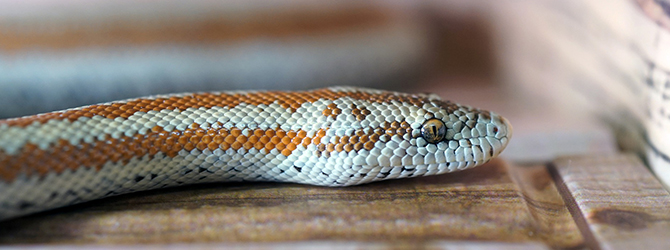Snake health problems: common health problems found in pet snakes
Most small snake species are generally healthy, hardy creatures that make relatively low-maintenance pets. But, like all pets, snakes can develop illnesses or conditions that need attention.
Let’s look at the signs and symptoms of some of the most common snake illnesses, and how to care for a sick snake.
If you suspect your snake is suffering from any of the conditions in this article, make an appointment with your specialist reptile vet.
Stomatitis in snakes
Stomatitis, commonly known as mouth rot, is a common condition caused when bacteria in the mouth gets into an open wound and causes infection in the lining of the gums.
Symptoms include swelling or colour change in your snake’s mouth and gums, or frequent rubbing of the mouth and not eating.
If you suspect mouth rot, consult your specialist reptile vet for advice, and be sure to keep your snake’s tank and water supply clean in the meantime.
Constipation in snakes
The digestive process varies according to the size and metabolism of your snake, but once you’re used to your pet’s pattern you’ll quickly notice any changes in how often your snake poos. Signs of constipation include bloating, lethargy and loss of appetite.
If you’re sure you’re dealing with a constipated snake, bathing your pet in warm water for around 15 minutes a day will encourage defecation. If this doesn’t work – or if you spot any swelling in the last third of your snake (near the tail) – take your snake to your specialist reptile vet, as your pet may have eaten something that’s blocking the digestive system.
Viruses in snakes
Viruses are more common in some species of pet snake, including pythons and boa constrictors. Symptoms can include not eating, weight loss, vomiting/regurgitation, nervous signs such as not being able to turn themselves the right way up if put on their backs, and many other unusual signs or behaviours.
If you suspect your snake is suffering from a virus, consult your specialist reptile vet immediately.
Mites in snakes
Mites are tiny black parasites that live on corn snakes and feed on their blood. They lay their eggs in the substrate of your snake’s tank and are usually spotted around the eyes, mouth and under their scales.
If you spot mites on your snake, bathe the snake in warm water and thoroughly disinfect the tank and its contents using an insecticide that is designed and licenced for snakes, to kill and stop the mites breeding. You will need to repeat this process several times. If the mites persist, make an appointment with your specialist reptile or exotics vet.
Skin conditions in snakes
Snakes can suffer from a number of skin conditions, including pus-filled blisters, abscesses caused by infected wounds, cuts and grazes, and problems with shedding. If your snake shows any signs of a skin condition, consult your specialist reptile vet.
Internal parasites in snakes
Internal parasites can be passed on by contact with infected snakes, or contracted from poor quality food items. Symptoms include vomiting/regurgitation, loss of appetite and lethargy. Your specialist reptile vet may prescribe a worming treatment or medication to eliminate them.
Vomiting/regurgitation in snakes
Vomiting/regurgitation can be a sign many things, including inappropriate temperatures (too hot or too cold), stress, internal parasites, viruses and being handled too soon after eating. Don’t handle your snake for at least 48 hours after your pet has eaten, to avoid interfering with the digestive process.
If your snake regurgitates food three times in row, do not feed again and, contact your specialist reptile vet for advice.
Respiratory problems in snakes
If you notice your snake having difficulty breathing, your reptile may have contracted a respiratory illness. This is often caused by inappropriate temperatures in the tank/vivarium, and checking the temperature regularly with a reptile thermometer is really important, do this day and night and take a note of the temperatures – should your pet snake need to go to the vets, you will be asked for this if you need to take your snake to the vets.
While minor respiratory infections and breathing problems may correct themselves, always consult your specialist reptile vet if the problem continues.
“Stomatitis is caused when bacteria in the mouth gets into an open wound and infects the lining of the gums.”
Signs that your snake needs veterinary care
Contact your specialist reptile vet if you suspect your snake is suffering from any of the conditions in this article, or if they display any of the symptoms below:
- Changes in behaviour
- Loss of appetite
- Lethargy
- Difficulty breathing
- Wrinkled skin
- Abnormal wee or poo
- Vomiting/regurgitation
- Loss of weight or condition
- Lumps or swelling
- Discharge or swelling from the eyes or nose
Want more information on snake illnesses?
For expert advice on snake health problems, speak to a specialist reptile vet.
Find your nearest vet using our Find a Vet page, or speak to a vet online using Online Vets.

